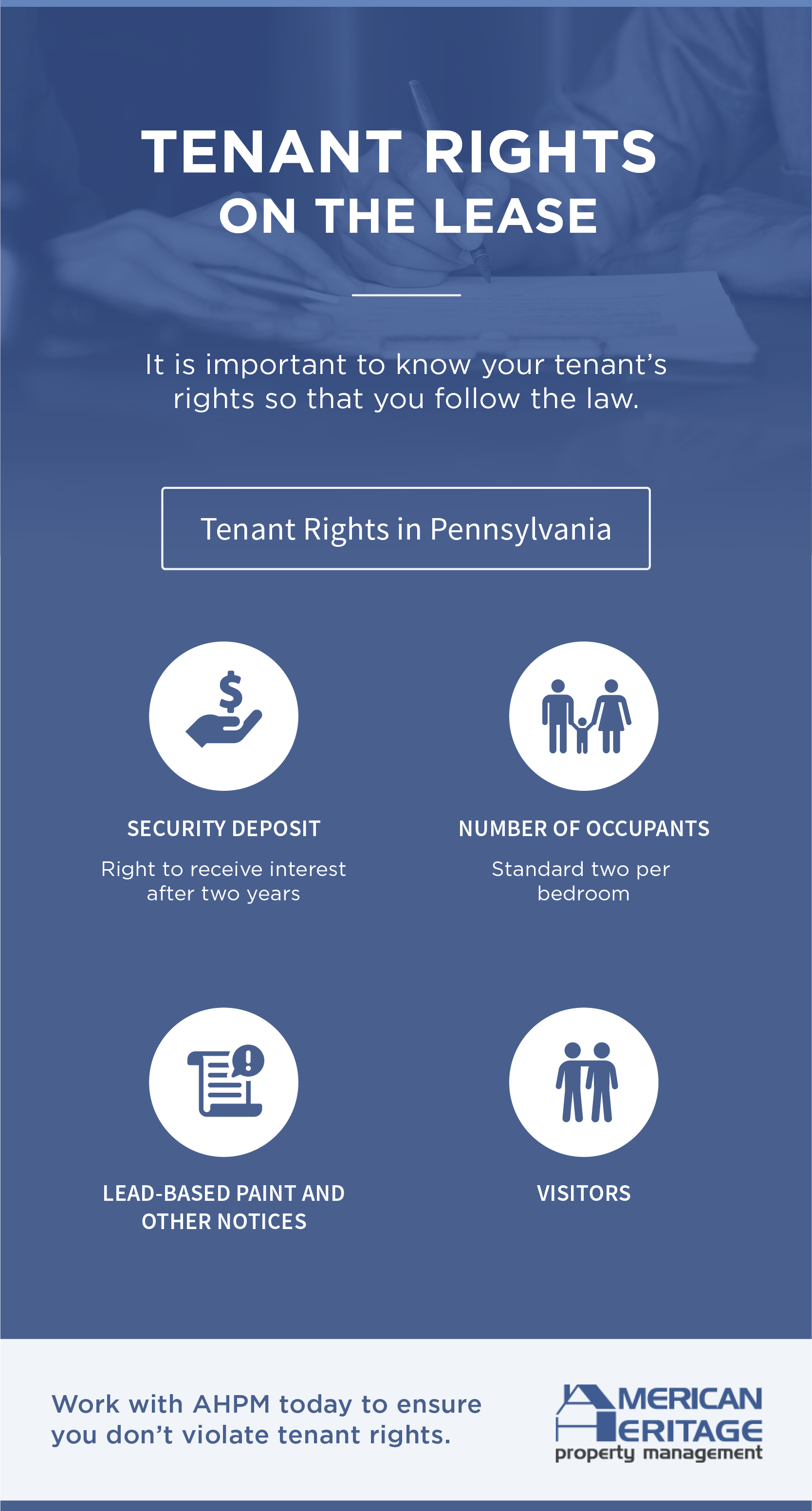13 Tenant Rights All Pennsylvania Landlords Must Know

Understanding Pennsylvania's tenant rights is essential for every landlord operating here. Our comprehensive guide defines these rights and provides a 13-point checklist to help you follow PA landlord-tenant law.
What Are Tenant Rights in Pennsylvania?
Under the Federal Fair Housing Act and the Pennsylvania Landlord-Tenant Act, every PA tenant has specific rights. Tenant rights in Pennsylvania grant a habitable living environment, fair treatment and a clear understanding of lease terms. Renters are entitled to privacy, with landlords required to provide notice before entry, except in emergencies.
Understanding tenant rights and rental laws in PA protects you against unintentional transgressions and ensures you respect your renters. Below, we'll give you an overview of critical federal and state laws.
Respecting Tenant Rights During the Apartment Search
Both federal and state legislation protect the rights of home seekers, guarding against housing discrimination and ensuring equal access to housing. The Pennsylvania Human Relations Act broadens protections, adding ancestry and the use of a guide or support animal as protected categories.
But what does that mean for landlords? Let's discuss these individual tenant rights and how they affect a landlord's rights and responsibilities in Pennsylvania.
1. Implement Equal Housing Practices
As an American landlord, you must practice equitable renting and consider all potential tenants. You cannot legally refuse a tenant based on the following protected categories:
- Color
- Disability
- Familial status
- National origin
- Religion
- Race
- Sex
Every potential tenant has a right to rent, irrespective of where they fall in these categories. Federal law was established in the late 1960s, and there has been a growing awareness and proactive approach toward fair housing practices in recent years.
For landlords keen on upholding fair living conditions, partnering with a property management company for tenant selection is beneficial. That collaboration helps ensure compliance with PA rental laws and fosters a more inclusive and welcoming community for potential tenants.
2. Enforce Inclusive Marketing
Landlords marketing or advertising an apartment or other property for rent must ensure the marketing upholds the Fair Housing Act, or equally considers all tenants. Landlords should focus on marketing amenities and features that make their properties attractive to prospective tenants.
That approach adheres to the law and invites families of various backgrounds to find their next home in a welcoming community. By emphasizing these practical and inclusive aspects, you can show your commitment to serving diverse housing needs.
It's important to note that advertising a property that isn't accessible to individuals with disabilities (provided it was built after March 13, 1991) also qualifies as discrimination.
3. Honor Tenant Rights Regarding Credit Checks and Adverse Actions
While credit checks can provide valuable insight into an individual's payment history, the Fair Credit Reporting Act (FCRA) stipulates crucial guidelines to protect tenant rights. As such, landlords cannot legally run credit checks on potential tenants without the prospective tenant's permission.
Once you have secured permission and requested and reviewed the report, you can make an informed decision. However, the law views any significant deviation from offering a lease as an “adverse” action. Adverse actions after reviewing a report include:
- Requiring a co-signer
- Turning down the application
- Increasing the rent
- Increasing the security deposit
If, based on the applicant's credit or consumer report, you decide to implement an adverse action rather than extend a lease, you'll need to follow a two-step process.
First, you must send the applicant a pre-adverse action notice, including a copy of the report, your intended action, and a summary of their consumer rights under the FCRA. This step is legally required and allows the tenant to dispute inaccuracies in the report.
If they cannot or do not contest the report, you can implement the adverse action and issue a final adverse action notice.
Understanding Tenant Rights on the Lease
Tenant rights in Pennsylvania also cover lease-related aspects, including security deposit sizes and lease terms.
4. Ensure the Security Deposit is Within Legal Limits
Rental laws in PA prohibit landlords from collecting the following as a security deposit:
- More than two months' rent for the first year's rental
- Over a month's rent for a tenant renting for two years or longer
If you hold a security deposit after a tenant has rented for over two years, they're entitled to receive interest.
5. Notify Tenants of Potential for Lead-Based Paint
For habitations pre-dating 1978, landlords should notify tenants about the potential use of lead-based paint. Provide a written notification, including an EPA-approved pamphlet on the subject. If you know conclusively that lead paint was used to paint the building, state that in the lease.
6. Allow Visitors and Enforce Legal Habitation Limits
The Pennsylvania Landlord-Tenant Act allows tenants to have visitors as long as they meet their other obligations. However, if these visitors stay more than 30 days or contribute rent, they qualify as tenants. As a landlord, you can't forbid overnight guests or limit how many visitors a renter has during a week or month.
So how many people can live in an apartment or other rental property in Pennsylvania? The standard is two people per bedroom — a two-bedroom house could accommodate up to four people. The recommendation is flexible, and a landlord might have acceptable reasons for limiting occupancy. If a small home has tiny bedrooms, for example, a court might allow the landlord to determine the number of occupants to one per bedroom.
On the other hand, there are cases where the two-person-per-bedroom standard can't apply if more people live in a property. For example, if a couple living in a one-bedroom apartment has a baby, a landlord will have difficulty evicting the couple for occupancy reasons.
7. Ensure Lease Terms Don't Violate the Law
While leases are legal contracts defining the terms of agreement between tenants and landlords, all clauses must adhere to the Fair Housing Act and the Pennsylvania Landlord-Tenant Act. If a clause violates the law, it is illegitimate and cannot be enforced.
This approach is sometimes complex and requires a careful balance between implementing positive guidelines and respecting tenant rights. For instance, landlords are entitled to reject applications from tenants with pets, but cannot refuse an application from an individual with a service or assistance animal (as per the Fair Housing Act).
Landlords can establish positive guidelines for guest visits and family-friendly living, aligning with legal standards and tenant rights. These proactive measures ensure compliance with fair housing regulations and create a welcoming, inclusive environment for all tenants.
8. Honor “No-Lease” Agreements as Written Agreements
Tenant and landlord rights and responsibilities remain clear and consistent in informal lease agreements, such as oral month-to-month tenancies. These arrangements provide flexibility while still ensuring stability and mutual respect.
Some specific tenant rights you should be aware of as a landlord include:
- Written notice if the tenant needs to vacate
- Notice periods before eviction
- The right to due process (a legal eviction process)
Since Pennsylvania law protects all tenants, whether tenancy agreements are written or oral, we recommend having a written lease. It provides clarity and ensures the details are recorded in the case of a dispute.
Honoring Tenant Rights After They Move In
Pennsylvania rental property laws continue to offer tenant rights after they occupy the property. Landlords should be aware of the following:
9. Honor Tenants' Right to Quiet Enjoyment
Tenants have the right to enjoy their homes peacefully, meaning a landlord can only enter a property when the tenant permits. As a landlord in PA, you must provide reasonable notice if you want to enter a tenant's rental property, even for legitimate reasons such as:
- Maintenance
- Inspections
- Property showings
Depending on the lease agreement, you'll need to provide advance notice of a specific period (typically 24 hours) to ensure the tenant's privacy rights receive due respect.
There is one exception to this rule — landlords may perform an emergency entry in the case of significant emergencies, such as severe water leaks or property fires.
10. Provide a Safe and Habitable Home
A 1979 Pennsylvania Supreme Court ruling declared it a landlord's responsibility to ensure a property is safe and sanitary. As a landlord, you can ensure your property is considered habitable by providing the following:
- Working smoke alarms
- Working hot water
- Drinking water
- Heat
- Adequate waste disposal and sewage
- Functioning/locking windows and doors
- Functioning bathroom(s)
Keeping a home safe and habitable requires input from both parties. Tenants are legally required to notify the landlord of failures of any essential equipment like heaters or water lines.
The landlord is responsible for prompt reactions and repairs, though the time frame may vary depending on the problem and the season. If the furnace breaks in the middle of January, immediate repairs are essential. If it breaks in August, a landlord can put off repairs until necessary.
Understand Tenant Rights if Something is Wrong
If a Pennsylvanian landlord doesn't uphold tenant rights, rental laws are on the tenant's side.
11. Rent Withholding or Deduction
As mentioned, the landlord is responsible for keeping a property habitable. Tenants are responsible for maintaining rent payments. However, under certain conditions, tenants may withhold rent or deduct repair costs from the total if repairs are not completed promptly.
The process looks like this:
- Step one: The tenant notifies the landlord of the problem, in writing.
- Step two: They give the landlord a reasonable time to complete the repairs.
- Step three: If the landlord has not made repairs after this time, the tenant can either opt for rent withholding or to repair and deduct.
Rent Withholding
If the tenant wants to withhold rent and force the landlord to make repairs, they may have the city or municipality’s housing inspector come out to investigate. If the inspector declares the home to be uninhabitable, the tenant does not need to keep paying rent.
Should the tenant decide to remain in the property, their monthly rental payments will go into an escrow account. If the landlord makes the needed repairs within six months, they will get the money in the escrow account.
“Repair and Deduct”
Instead of the above route, a tenant may get cost estimates and have the repairs done. However, there are a few basic requirements:
- The repairs must be necessary to make the property habitable.
- The repairs must cost less than the total rent remaining on the lease.
- The tenant must provide an itemized bill detailing the costs of repair.
If the repairs check these boxes and the landlord fails to complete them, the tenant may handle the work and deduct the cost from their next rent payment.
End-of-Lease Tenant Rights
As the end of the lease gets nearer or right after a tenant moves out, they still have a few legal rights landlords need to know about.
12. Give the Tenant Notice
If you would like to change the rental status of a particular tenant after their lease is up, you need to provide them with ample notice. How much notice depends on the length of the lease, with Pennsylvania landlord laws requiring the following:
- Leases under one year: At least 15 days' notice.
- Month-to-month leases: At least 15 days' notice.
- Leases for a year or longer: At least 30 days' notice.
If you need to evict tenants, you must also notify them as part of the eviction process. The amount of notice required depends on the reason for the eviction and is usually anywhere from 10 to 30 days in Pennsylvania.
13. Return the Security Deposit
When a tenant leaves, you should return their security deposit within 30 days of their vacating the premises. If you deduct anything from the deposit, provide an itemized list of any damaged areas and the charges for repairing them. If you withhold the full security deposit, they can sue for double the deposit amount.
Let AHPM Help You Manage Your Property
As a landlord in Pennsylvania, you have a lot on your plate. Remembering and applying countless tenant laws is difficult, especially when some require a sensitive balance and attention to detail. Ensure you meet all the requirements and respect tenants' legal rights with an experienced property management company.
American Heritage Property Management has served landlords in Baltimore and Central Pennsylvania for over 40 years. We handle everything from tenant screening to transitions and maintenance, so you don't have to. Contact us today to learn how we can elevate your rental property management and help you avoid legal pitfalls.





